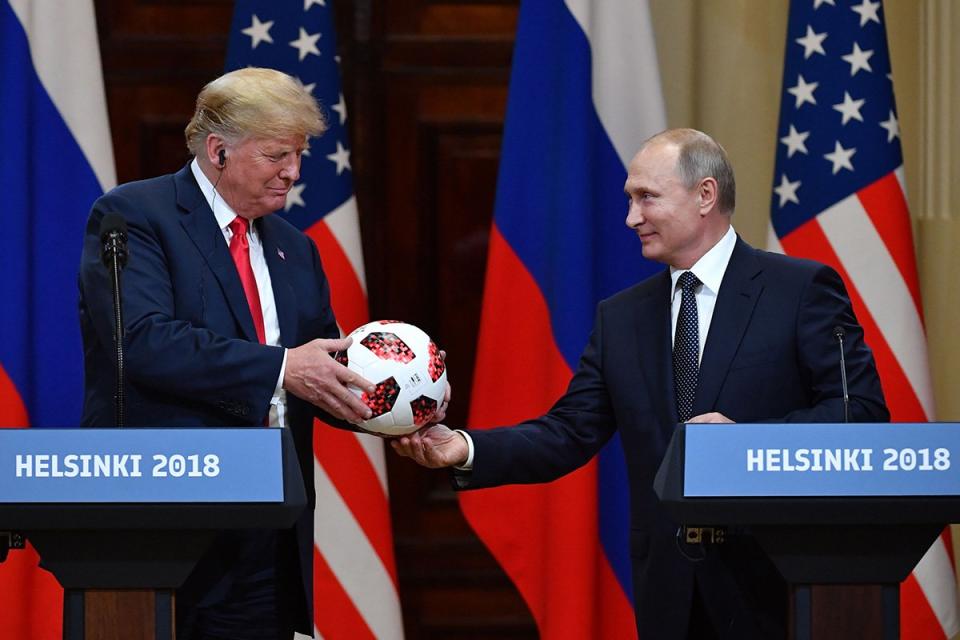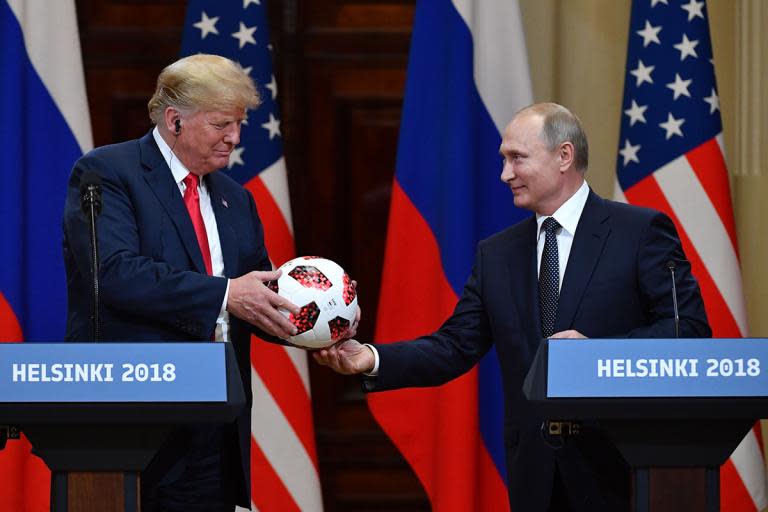Donald Trump is cosying up to Vladimir Putin while cutting off Europe – we should be scared
The most important and critical time in American foreign policy since the coming of the Trump administration has been unfolding over the last month with Vladimir Putin emerging as the clear and undisputed winner. Unfailingly and relentlessly, the actions and words of the president of the United States have weakened his Western allies while strengthening Russia.
What emerged at the Helsinki summit further illustrated the Russian leader’s winning position. He had, he said openly at their joint press conference, wanted Trump to win the US presidential election over Hillary Clinton, something he has now achieved. Trump, asked directly whether he believed his own country’s intelligence services, who have repeatedly accused the Kremlin of interfering in the election, or Putin, who denies this was the case, responded: “President Putin says it’s not Russia. I don’t see why it should be. President Putin was extremely strong and powerful in his denial...”
Putin was directly asked whether the Kremlin has compromising material, “kompromat”, on Trump and prostitutes as has long been rumoured and claimed in one of the more salacious sections of former MI6 officer Christopher Steele’s dossier. The Russian leader answered: “I did hear these rumours. When President Trump visited Moscow back then, I didn’t even know he was in Moscow... Nobody informed me that he was in Moscow... Please disregard these issues.” The Russian president had the perfect opportunity to deny having embarrassing secrets about Trump: he failed to do so.
Trump, in his industrial size outpouring of tweets, has insulted and attacked people around the world. But the one person he has been extremely careful not to criticise is Putin. In fact, in his 18 months in office, Trump has praised the Russian leader 11 times publicly and there had been numerous other compliments before the election, when he was seeking business deals with Russia.
This has led, understandably, to Trump’s suspicious critics asking: “Just why is The Donald so afraid of offending Putin?” Nothing which came out of Helsinki dispelled those suspicions. The question was repeated by the Democrat senator Nancy Pelosi in the aftermath of the summit: “Seriously what does Putin have on Trump that he’s so afraid?” the senator asked.
Trump’s display at the press conference led to shock and anger in the US. John Brennan, the former CIA director, tweeted “Donald Trump’s press conference performance in Helsinki rises to and exceeds the threshold of ‘high crimes and misdemeanours’. It was nothing sort of treasonous. Not only were Trump’s comments imbecilic, he is wholly in the pocket of Putin. Republican patriots: where are you???”
One of those Republicans, Lindsay Graham, held that Trump’s failure to hold Moscow accountable for election interference and seemingly absolving them “will be seen by Russia as a sign of weakness and create far more problems than it solves”. The senator, who has turned from being a fierce Trump critic to cosying up to him, also suggested that a football Putin presented to the US president should be “checked for listening devices and never allowed into the White House”.
Another Republican senator, Jeff Flake, tweeted: “I never thought I would see the day when our American president would stand on the stage with the Russian president and place blame on the United States for Russian aggression. This is shameful.”
Trump had held his meeting with Putin days after Special Counsel Robert Mueller indicted 12 officers from the Russian military intelligence service, GRU, over attempts to suborn the election. The GRU or its former officers, it is claimed, may also have been responsible for the Salisbury novichok attack.
The British government, it should be stressed has yet to put forward prosecutable evidence to back up this allegation. But we were told by Downing Street officials that Theresa May had asked Trump to raise the novichok issue with Putin. American officials were unaware that the president had done so.
But there should not have been that much of a surprise at Trump’s posture. Helsinki was the last leg in his three-point journey, one which he has stressed will be the easiest for him and most looked forward to. En route he had done his utmost to destabilise Nato at Brussels and then, in Britain, undermine Theresa May’s premiership.
The US president has called the European Union a "foe" and blamed bad relations with Russia on the investigation into the Kremlin’s interference in the US election, rather than the interference itself. And all this has happened after asking that Russia, expelled from the G7 over the annexation of Crimea, be allowed to rejoin the group, and pressurising Emmanuel Macron for France to leave the European Union.
It had been forecast ever since Trump’s unexpected election victory that he would try to shape a new world order. A combination of senior administration officials and the Republican Party hierarchy had so far stayed his hand. But now, with most of the moderate voices gone from the White House in its extraordinary churn, and the Republican Party being moulded to his image rather than the other way around, Trump is now free to pursue his aims.
Some of America’s European allies are now resigned to the changing status quo. Heiko Maas, the German foreign minister, complained about the US president’s “sharp verbal attacks” and “absurd tweets” and acknowledged “we can no longer completely rely on the White House”. European Council president Donald Tusk claimed Trump was spreading “fake news” by saying the European Union was a foe.
Trump’s regular attacks on Western allies, Nato and the European Union, and lack of criticism of the Kremlin has surprised even Russian analysts. “We are witnessing something surprising, something even the Soviet Union was not able to accomplish – divide the US and Western Europe”, Tatyana Parkhalina, president of the Russian Association for Euro-Atlantic Cooperation pointed out in a Russian state TV show. “It didn’t work then, but it seems to be working with Trump now.”
As the summit began the Kremlin run television channel, Rossiya 1, described the Helsinki summit as the “main political event” of the year, maintaining “the show is over. Now the work begins. After all he was just passing through Brussels and London on his way to Helsinki.”
But Trump was not just passing through Brussels and London, he was wreaking deliberate havoc on the way. The meeting with Putin may well have been the main political event of the journey, and maybe it is indeed the case that “now the work begins”. It is the nature of that work which will be of worry to America’s Western allies as they find themselves pushed away by the US president.

 Yahoo News
Yahoo News 

